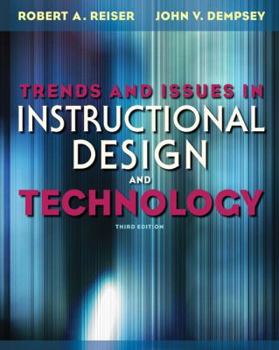Trends and Issues in Instructional Design and Technology
Select Format
Select Condition 
Book Overview
Written by the leading figures in the field, this book clearly defines and describes the rapidly converging fields of instructional design, instructional technology, and performance technology. The... This description may be from another edition of this product.
Format:Paperback
Language:English
ISBN:0132563584
ISBN13:9780132563581
Release Date:March 2011
Publisher:Pearson
Length:408 Pages
Weight:0.25 lbs.
Dimensions:0.5" x 7.9" x 9.9"
Customer Reviews
5 ratings
Broad overview of ID
Published by Thriftbooks.com User , 15 years ago
This book is excellent for the pedestrian who would like to understand exactly what Instructional Technology and Design really is. It's an easy read, helpful to those wanting an introduction to the field, and includes pragmatic essays from active members in the community. After reading it, you'll want to explore some of the topics covered in greater depth. The book lets you understand what those topics actually are- it's a great first step in your study of the field. If you are considering a degree in this area, this book will help your decision process quite a bit.
Standard text for the field
Published by Thriftbooks.com User , 15 years ago
This is the standard per all my ID buddies, so I use it in developing my Blackboard teaching sites.
Good flow from historical development to modern issues
Published by Thriftbooks.com User , 15 years ago
The flow of this text represents a good reflection of the design process as it has adapted from historical development to modern occurrences and issues. The beginning discusses the complexities of actually naming and defining instructional design and technology. The author then moves to the history of design theories and theorists along with design models, giving the reader a good foundation for the rest of the text. The book then moves to current theories, designs, and methods used for designing management teams. Multiple settings for utilizing instructional design and technology are discussed with implications and complications occurring within these different facets. The author finishes the text by discussing what the future may bring for the field and the reforms necessary to keep up with current trends and issues. Upon reading multiple research articles citing this text as a reference, I decided to read it myself. While currently a doctoral candidate in Instructional Technology this was an extremely helpful textbook. I would highly recommend it for those studying in the field and for those who are just curious about the design process. Reiser and Dempsey have an extraordinary way of writing not as a boring text but more as a story. The chapters are short, much like a James Patterson novel, so for people like myself with a short attention span it worked well. Now don't get me wrong, it is still a textbook with a conceptual structure providing information without suspense. I am merely stating it didn't put me to sleep. I could easily read a couple of chapters, put it down, and pick it up another time. It was probably one of the first textbooks I have read from cover to cover. The chapter on the history of instructional design is extremely informing. It is interesting to find most early design models originated from military intelligence operations. This coincides with most advanced technologies so it really ties in with technological designs. I work in education so the chapter on motivation (chapter 6), and of course, instructional design and technology in schools (chapter 18) was of great interest. The motivational chapter was informative, but if you studied any amount of psychology the concepts are relatively similar. The book extends motivational theories, but I would really like to know what motivational interventions have been effective. In addition, there is controversy regarding whether education is really keeping up with the changing attitudes and behaviors of our children regarding technology. The authors' seemed to sway towards an overhaul of the educational system to utilize more constructivism, problem based learning and move toward an educational systems design. Although, education seems to be getting less attention politically than needed for a revamp of the current structure. Again, I enjoyed this book and recommend it to anyone needing further information on instructional design methods and theorie
Pretty good -basic coverage
Published by Thriftbooks.com User , 16 years ago
I have had three text books which cover the material in this book and it is the most intelligible. I can't say that I really enjoyed it, but there is some good material and it is a pretty easy read without being uselessly lightweight.
well organized
Published by Thriftbooks.com User , 16 years ago
I used this book for class. The text is very well organized with bolded headings for each section in every chapter. Each chapter is broken down into easy to understand sections.





